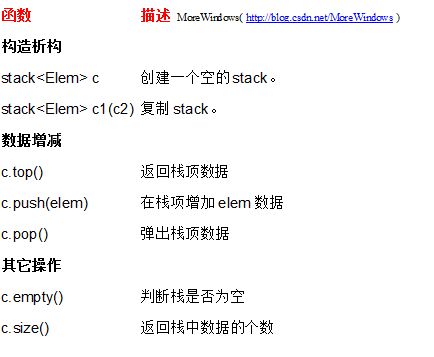STL系列之二 stack栈
栈(statck)这种数据结构在计算机中是相当出名的。栈中的数据是先进后出的(First In Last Out, FILO)。栈只有一个出口,允许新增元素(只能在栈顶上增加)、移出元素(只能移出栈顶元素)、取得栈顶元素等操作。在STL中,栈是以别的容器作为底部结构,再将接口改变,使之符合栈的特性就可以了。因此实现非常的方便。下面就给出栈的函数列表和VS2008中栈的源代码,在STL中栈一共就5个
·
栈(statck)这种数据结构在计算机中是相当出名的。栈中的数据是先进后出的(First In Last Out, FILO)。栈只有一个出口,允许新增元素(只能在栈顶上增加)、移出元素(只能移出栈顶元素)、取得栈顶元素等操作。在STL中,栈是以别的容器作为底部结构,再将接口改变,使之符合栈的特性就可以了。因此实现非常的方便。下面就给出栈的函数列表和VS2008中栈的源代码,在STL中栈一共就5个常用操作函数(top()、push()、pop()、 size()、empty() ),很好记的。

VS2008中栈的源代码
友情提示:初次阅读时请注意其实现思想,不要在细节上浪费过多的时间。
//VS2008中 stack的定义 MoreWindows整理(http://blog.csdn.net/MoreWindows)
template<class _Ty, class _Container = deque<_Ty> >
class stack
{ // LIFO queue implemented with a container
public:
typedef _Container container_type;
typedef typename _Container::value_type value_type;
typedef typename _Container::size_type size_type;
typedef typename _Container::reference reference;
typedef typename _Container::const_reference const_reference;
stack() : c()
{ // construct with empty container
}
explicit stack(const _Container& _Cont) : c(_Cont)
{ // construct by copying specified container
}
bool empty() const
{ // test if stack is empty
return (c.empty());
}
size_type size() const
{ // test length of stack
return (c.size());
}
reference top()
{ // return last element of mutable stack
return (c.back());
}
const_reference top() const
{ // return last element of nonmutable stack
return (c.back());
}
void push(const value_type& _Val)
{ // insert element at end
c.push_back(_Val);
}
void pop()
{ // erase last element
c.pop_back();
}
const _Container& _Get_container() const
{ // get reference to container
return (c);
}
protected:
_Container c; // the underlying container
};可以看出,由于栈只是进一步封装别的数据结构,并提供自己的接口,所以代码非常简洁,如果不指定容器,默认是用deque来作为其底层数据结构的(对deque不是很了解?可以参阅《STL系列之一 deque双向队列》)。下面给出栈的使用范例:
//栈 stack支持 empty() size() top() push() pop()
// by MoreWindows(http://blog.csdn.net/MoreWindows)
#include <stack>
#include <vector>
#include <list>
#include <cstdio>
using namespace std;
int main()
{
//可以使用list或vector作为栈的容器,默认是使用deque的。
stack<int, list<int>> a;
stack<int, vector<int>> b;
int i;
//压入数据
for (i = 0; i < 10; i++)
{
a.push(i);
b.push(i);
}
//栈的大小
printf("%d %d\n", a.size(), b.size());
//取栈项数据并将数据弹出栈
while (!a.empty())
{
printf("%d ", a.top());
a.pop();
}
putchar('\n');
while (!b.empty())
{
printf("%d ", b.top());
b.pop();
}
putchar('\n');
return 0;
}
转载请标明出处,原文地址:http://blog.csdn.net/morewindows/article/details/6950881
更多推荐
 已为社区贡献5条内容
已为社区贡献5条内容










所有评论(0)